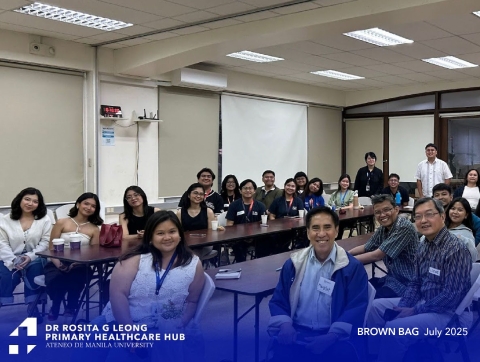ASMPH faculty development workshop addresses AI integration in medical education
25 Jan 2025
In a significant step toward understanding the role of artificial intelligence in medical education, the Ateneo School of Medicine and Public Health (ASMPH) recently conducted a comprehensive faculty training session on "Teaching with Generative AI." The timing proved particularly opportune, coinciding with the release of an official Ateneo University memorandum on AI integration one day prior to the session.
Dr Ray Baquiran, Associate Dean of ASMPH highlighted this serendipitous timing in his opening remarks, noting, "Let’s try to update ourselves with technology our students are already using." He emphasized the importance of continuous improvement and adaptation in teaching methodologies, encouraging faculty members to engage critically with these technological changes to become more effective teachers and formators.

The training was led by distinguished speaker Dr Iris Thiele Isip Tan, Professor from the UP College of Medicine and Director of the Interactive Learning Center. Dr Tan, who serves as Chief of the Medical Informatics Unit at UP Manila, brought her expertise to guide ASMPH faculty through the complexities of AI integration in medical education.

During the session, Dr Tan emphasized the critical need to understand AI's fundamentals before implementation. "Let's not overhype AI," she cautioned, stressing that experimental validation remains crucial. The training focused on evaluating AI tools' potential applications and limitations, maintaining academic integrity, and practical implementation through hands-on workshops.
The program explored Large Language Models (LLMs) and their applications, with particular attention to tools like ChatGPT, Claude, Gemini and others. Dr Tan addressed the challenge of automation complacency, warning faculty members about the risks of over-reliance on AI and its potential threat to physician autonomy. She stressed the importance of maintaining critical thinking skills, particularly when using AI in medical contexts, noting inconsistencies in how different AI models handle clinical case management.
The training included practical sessions where faculty members learned the importance of iteration and careful review of AI-generated content. Dr Tan shared real-world examples, including instances where AI-generated test questions appeared to duplicate existing exam material, highlighting the need for vigilant oversight.

As medical education continues to evolve with technology, Dr Tan emphasized that while AI will transform healthcare delivery and medical education, the fundamental aspects of medical practice remain deeply human. The doctor-patient relationship, built on empathy and trust, stands as an irreplaceable element that technology cannot replicate. While healthcare professionals must prepare for evolving roles as AI advances, complex medical decision-making will continue to require human expertise and judgment.
Through this proactive faculty development initiative, ASMPH demonstrates its commitment to preparing future physicians who can leverage technological innovations while maintaining the irreplaceable human elements of medical practice and keeping the human in the loop and at the helm of the doctor-patient interaction. The future of medicine lies not in choosing between technology and human expertise, but in thoughtfully integrating both to provide the best possible patient care.







